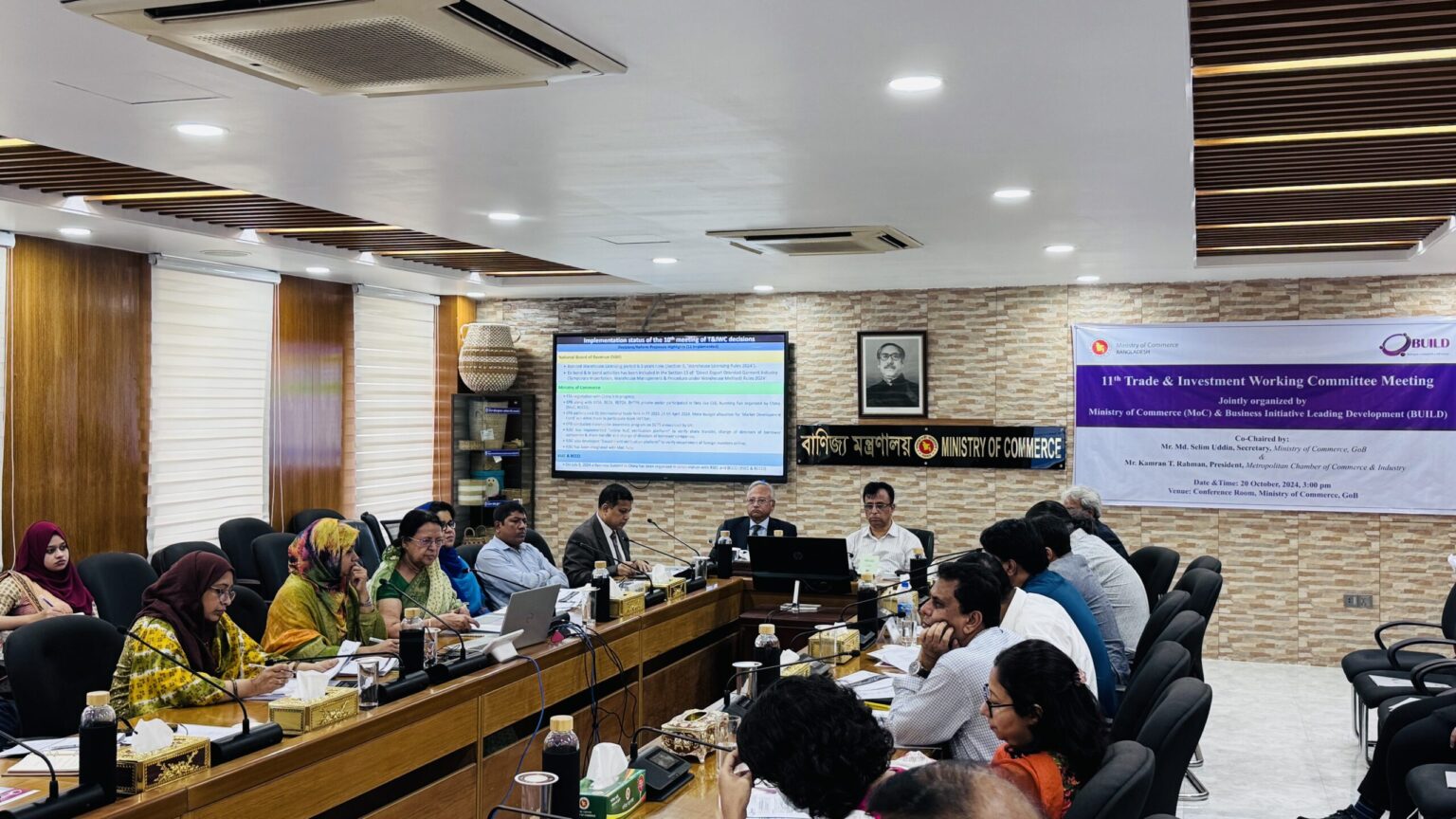The 11th Trade and Investment Working Committee of BUILD, co-chaired by Md Selim Uddin, secretary, Ministry of Commerce, and Kamran T Rahman, president of the Metropolitan Chamber of Commerce and Industry (MCCI), was held on 20 October at the conference room of MoC to discuss business-starting registration and licensing requirements—alternatives to cash incentives to remain competitive in the post-graduation regime.
Referring to the proposal for signing an FTA, the committee secretary, MoC, and co-chair emphasised the initiative to finalise the free trade agreement (FTA) with China, reinforcing the government’s commitment to enhancing trade relations. He emphasised the need to streamline RJSC services by reducing discretionary powers to create a more investment-friendly environment. Additionally, he urged the prompt implementation of a five-year trade licence issuance and renewal process by all relevant authorities, particularly the Union Parishad, to facilitate smoother business operations and support local enterprises. In response to the implementation report of the 10th T&I meeting presented by Ferdaus Ara Begum, CEO of BUILD, the MoC secretary requested reform suggestions to make RJSC more supportive of businesses.
While presenting the policy paper on “Local Government Act 2009 – Rationale of Trade Licence Issuance by the Authorities”, Kanis Fatama, senior research associate of BUILD, underscored the hurdles faced by entrepreneurs in Bangladesh while obtaining trade licences, including lengthy and stringent procedures with additional costs. The study reveals that local government agencies can collect taxes from all businesses under the Local Government Act 2009 (City Corporation, Municipality, and Union Parishad) rather than issue trade licences for starting a business.
Furthermore, industrial entities must obtain multiple initial registrations, licences, and approvals beyond sector-specific licences, complicating the business environment and affecting investment readiness. To streamline the process, BUILD recommends the introduction of an online primary business registration for all types of businesses, which can be issued by a single authority, following the example of Singapore.
Anwar Pasha, joint secretary and administrator of the Chittagong Chamber of Commerce & Industry, proposed the establishment of a working group that includes all relevant stakeholders chaired by the Ministry of Commerce (MoC) secretary. This working group would review the proposals from the BUILD study aimed at simplifying the trade licence process and introducing a unified system for issuing trade licences through a single authority. Endorsing this proposal, Md Shamsul Hoque, joint secretary of the Local Government Division, emphasised the importance of facilitating initial business registration from a single point and establishing a revenue-sharing mechanism among the respective agencies.
BUILD CEO Ferdaus Ara Begum shared insights from a study on “Export Growth Targets & Supportive Policies for Sustenance at the Post-LDC Regime”, where the prospects regarding alternatives to cash incentives were raised. After LDC graduation, Bangladesh’s trade policy needs to be WTO compliant; thus, giving direct cash incentives to exporters will no longer be possible. Bangladesh Bank has already reduced the cash subsidy twice, once in February and again in June 2024, negatively impacting several export items. The presentation highlighted the nature of prohibited subsidies, actionable subsidies, and other subsidies per WTO guidelines. Examples of countervailing measures in different countries were provided, as well as allowable supports such as loans and land at cheaper rates, tax benefits, support for items in the green box as per WTO guidelines, insurance, research and development, environmental protection, and the creation of new markets and products. Giving examples of other countries providing production-linked incentives, the study suggested simplification of the duty drawback system, specially bonded warehouses, interest rate subsidies, EDF, back-to-back L/C for all exports, exporters’ retention quota, infrastructural and compliance-related supports as alternatives to cash incentives.
Ibnul Wara, a member of LFMEAB, and Mostofa Monwar Bhuiyan, director of BKMEA, urged the government to continue cash incentive benefits until LDC graduation as they focus on building capacity for compliance and related challenges. Kamran T. Rahman, president of MCCI, endorsed the recommendations and called for a study to suggest policies for increasing the use of green and renewable energy (RE) by the industries, particularly exporters, to ensure that Bangladesh achieves 40% electricity consumption from RE by 2030 and reaches net zero by 2050. He proposed that a corporate purchase framework could be a viable option to provide factories with RE through the national grid. Dr Mostafa Abid Khan, CM-1, SSGP, ERD, emphasised the issue of fees and tax and enquired how tax is imposed on licence fees. At the same time, he recommended that registration should not be renewed yearly. Md Anwar Hossain, vice chairman of the Export Promotion Bureau (EPB), informed that the export policy for 2024–27 has already been gazetted, allowing businesses to take advantage of its benefits. Additionally, Nurul Islam, CEO of BTA, highlighted the importance of adopting technology to enhance compliance, suggesting that the Green Transformation Fund could be utilised for this purpose. The secretary general of DCCI, Afsarul Arifeen, emphasised the coordination among all concerned government agencies and stakeholders. Ariful Haque, joint secretary and director general of BIDA, informed that BIDA is working to provide all support services for investors through an effective OSS. Mohammad Navid Safiullah, additional secretary of the export wing of the Ministry of Commerce, concluded the session by thanking BUILD for presenting two important policy papers. He suggested introducing a suitable app-based system to provide all services through a single authority to facilitate the private sector while advocating measures to reduce business costs to remain competitive in the post-LDC graduation stage. Anwar Hossain Chowdhury, MD of SMEF; Al Mamun Mridha, secretary general of BCCCI; and other representatives from MoC, RJSC, CBC, NBR, BTTC, BFTI, BGMEA, BSBA, LFMEAB, BAPA, BTMA, among others, spoke in the meeting.
The press release (Bangla and English) is included for your use. Please get in touch with us if you have any queries.

